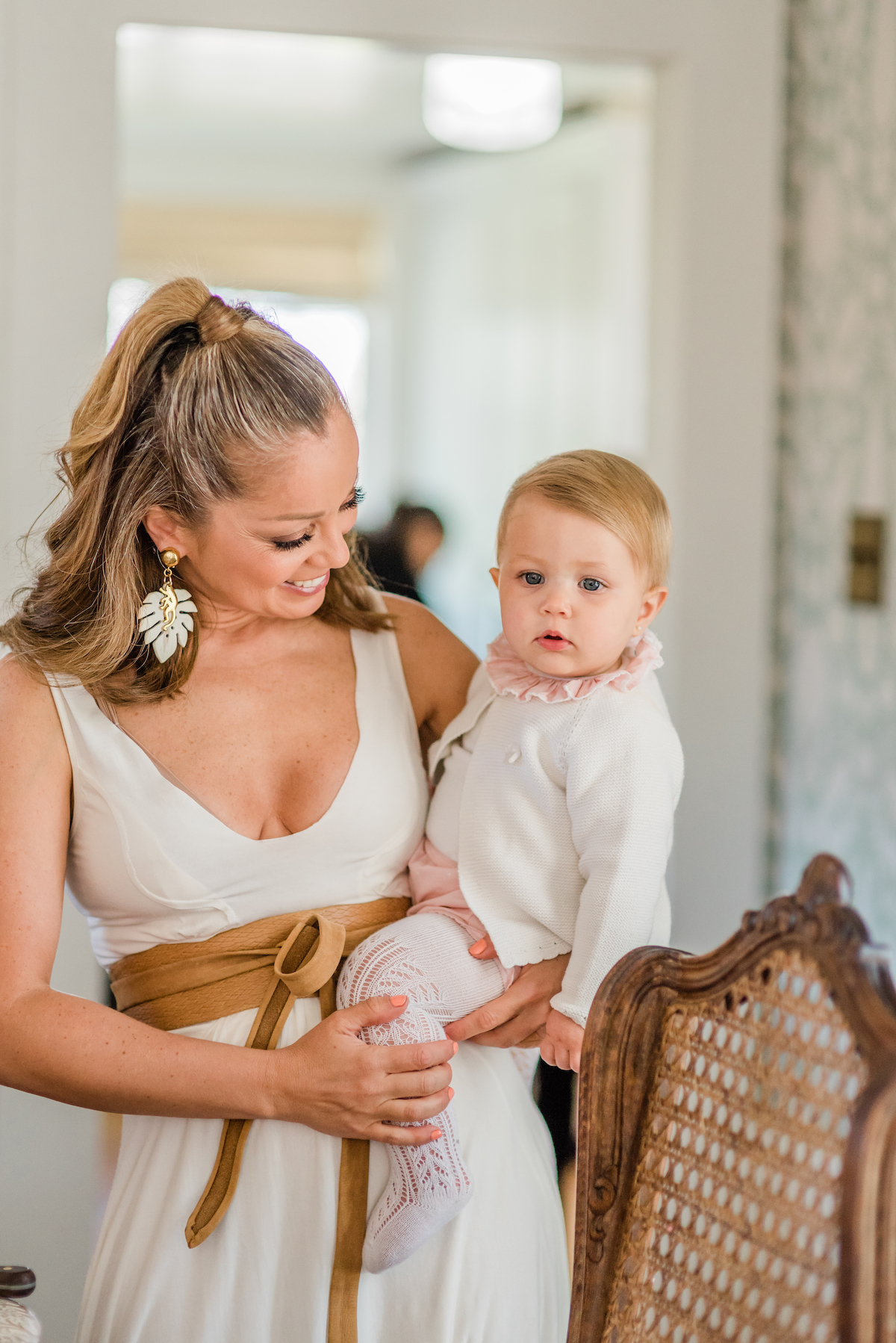After 40 weeks of being pregnant and dreaming about your future baby, most new moms assume they’ll be over the moon and totally blissed out once their newborn arrives. So it can come as a surprise when the experience of becoming a parent feels emotionally, mentally, and physically draining, even to the point of depression.
Up to 20% of new moms experience this difficult diagnosis, and sadly the leading cause of death in postpartum women is suicide, a shocking statistic that is making headlines and getting attention in the birth world as of late. We need to pay more attention to mental health postpartum. This isn’t a feel good topic. It’s not always pretty, but this is something that we can’t shy away from. It’s deserves to be talked about. Normalized. Recognized. And treated. So let’s look at the facts.
 photo by Brandi Schutt
photo by Brandi Schutt
Having a baby is not all sunshine and snuggles.
While you surely may have moments of happiness and excitement, moments of fear, anxiety, tears, sadness, frustration and overwhelming pangs of ….“omg what did we just do” feelings are also very real (and okay.) Sometimes those intense emotions may move from just once in a while to an all-out-full-on-slump. Women who have experienced postpartum depression often describe it as living through a fog of sadness or grief that they weren’t always able to recognize until later – or maybe were too scared or intimidated to confront.
Luckily, the last few years have seen an important shift to focus on the postpartum period for mothers. (‘Postpartum’ means after you have a baby, by the way). Women and women’s health advocates are working to create awareness, normalize mental health disorders and reassure women it’s okay to not be okay post-baby. It’s increasingly clear that women need support, community, sleep (seriously, it’s very important), and loving space to nourish and grow a healthy family. Learn about risks, signs, symptoms, treatment options and why it’s okay to need help if you or someone else is in a tough place after baby.
What are the “baby blues?”
After you have a baby it’s not abnormal to go through something often referred to as “the baby blues.” Your female hormones, estrogen and progesterone are fluctuating in an attempt to regulate, you’re dealing with drawn out sleep deprivation, a lot of new responsibility, stressors (like your mother-in-law staying to help for 2 months) and plenty of unknowns. Clearly there is a lot going on! This baby blues period however typically only lasts for 1-2 weeks. It’s not uncommon for parents to have major crying outbursts of extreme happiness or sadness or even bouts of anger during these times. I’ve heard it described as feeling very overwhelmed by life and emotion in general. That’s the baby blues, and this period should resolve on it’s own. What happens if it doesn’t? Let’s talk about the diagnosis of postpartum depression and anxiety.
 photo by Andrea Patricia Photography
photo by Andrea Patricia Photography
Postpartum Depression and Anxiety
If the feelings I described in the baby blues section continue for longer than 2 weeks or get worse, you may be dealing with postpartum depression and/or anxiety (PPD) (PPA). An expanded list of symptoms is below. Feeling some of the emotions listed below once in a while probably is not a diagnosis, and the only person who can officially diagnose you is your healthcare provider. If you’re reading this and are concerned, do not wait until your next scheduled appointment to address these issues. Call your providers office ASAP and ask to come in.
Depression
- Feelings of Overwhelming Sadness
- Increased irritability and quickness to anger with those around you
- Difficulty bonding with baby
- Problem eating or sleeping
- Upsetting or disturbing thoughts you can’t get rid of
- Feelings of “getting out of control” or “going crazy”
- Wishing you never became a mother
- Worried you may hurt yourself, other children or your baby.
Anxiety / OCD
- Inability to sleep
- Obsession or compulsion with a certain topic like babies sleep or feeding pattern
- Feeling like you have too much energy or feel “high” all the time
- Overwhelming feelings of panic or dread
- Scary thoughts that you can’t control
- Inability to control your mind from racing about things you can’t control
- Panic
Certain experiences in the postpartum period may also increase your risk for depression and anxiety after baby. It’s wise to be aware of these, and they include:
- A prior history of depression or anxiety pre-pregnancy
- Difficulty breastfeeding
- A hard or traumatic birth experience
- A baby in the NICU or baby who isn’t doing well health wise after birth
- Weight Gain / Loss Struggles
- New health diagnoses for yourself after baby
- Extreme sleep deprivation
- Lack of family or social support
 photo by Jessica Attie
photo by Jessica Attie
What’s Next?
If you’re concerned you may have postpartum depression or anxiety you are already one step ahead. Connecting with your emotions and asking for help is huge. If you’re not sure or you’re scared to know, ask the people around you how they think you’re doing and for help. Often times we don’t see depression or anxiety in ourselves right away – it can take many years and a lot of self work to really tune in….and that’s okay.
1. Call your provider and make an appointment. It doesn’t matter if you had your baby last week or last year – your midwife or OB/GYN should be able to connect you to resources and talk to you about treatment options.
2. Know that treating postpartum depression with therapy and medications or just therapy alone are both perfectly acceptable options (dependent on the level of severity of your depression). If your provider is very concerned about you or your safety they may recommend medication and its important to consider this option and how it may help you. If you’re not wanting to turn to antidepressant medications right away it’s okay to start with therapy (I recommend going regularly! at least 1x per week) and see how things go before starting meds.
3. Consider making a safety plan or “tough times” plan with your partner / family / support system. This is a written or typed plan of action you and your family can lean on if things aren’t going well. I recommend including these main points:
- Name/phone number of your doctors office
- Name/phone number of the closest emergency psychiatric center
- All of your friends / and main support systems phones numbers and names in one place so your partner can ask them for help if you need it.
- The signs and symptoms you recognize in yourself when things are starting to not go well – discuss them with your partner/family.
- Think about giving your partner ‘written permission’ to get you help if you’re in a very bad place – so everyone is on the same page when things get muddier. It’s not a legal thing but sometimes if feels helpful to just know you have that trust in each other.
- A list of things you can do to help yourself get to a better mental space: Examples:
- give baby to your partner with pumped milk/formula and get at least a 6 hour block of sleep.
- Take some time for a hot bath alone, a manicure or a nature walk whatever it is that fills your cup and makes you feel good.
- Get out of the house with baby and make plans with friends
- Go to a postpartum support group in your area
 photo by Teal Thomsen
photo by Teal Thomsen
How ALL moms can support their mental health postpartum
- SLEEP! 8-10 hours of sleep per day while baby is little is crucial. When you’re sleep deprived all emotional ability to deal with life goes out the window. If you need help getting back on track ask a friend or family member to come over and watch baby in between feeds while you konk out – use benadryl or melatonin to get some deeeeep sleeepy time and catch up….. and then make it a priority moving forward. Sleep when baby sleeps and work as a team to get as much shut eye as possible. This is hugely helpful.
- Think about Your History. If you have a strong history of depression or anxiety from the past consider starting medications at the end of pregnancy before you deliver or as soon as you birth to help support your mental health after baby. We know now that the risks associated with antidepressants like zoloft are very low compared to the risks of a mentally unstable mama after baby. Research shows that meds like zoloft are safe to use while breastfeeding. Babies whose mamas take zoloft have no detectable levels of zoloft in their bloodstream when tested. It’s all about weighing risks and benefits and what is right for you. You don’t have to be a super woman.
- Be Gentle. Be gentle with yourself and your expectations. Women who are perfectionists or have too many expectation about “how thingas should go” tend to have a hard time after baby….. there is literally very little you can control and if things don’t go right – it’s not about YOU its about LIFE! Learning to gently accept going with the flow, making quick last minute changes and being okay with everything happening one day at a time is crucial to surviving postpartum. Waking up every day and just feeding your baby, getting enough sleep, and giving yourself space to adjust to this new lifestyle is enough! You will get back to regular YOU but right now you’re new mama you, and that is right where you should be, figuring it all out.
- Recognize that 6 weeks is an arbitrary number. Whatever you do – don’t expect to look / feel / or act anything like you did pre-baby at 6 weeks postpartum.. 6 weeks is just a number the medical world recognizes as the time when your uterus contracts back down to pre baby size and your bleeding tends to stop. It took you 10 months to grow and change into a fully pregnant woman capable of supporting new life so give yourself at least that time to adjust to motherhood and get into the swing of the new you plus babe. Be gentle, loving and kind to the beautiful body that supported and grew new life and give it time to find it’s non-pregnant balance. Pushing it with excessive workouts and obsessive dieting is unhealthy and often affects your milk supply and worsens depression and anxiety. Set realistic expectations and don’t compare yourself. You are enough, you are beautiful, you are a mother, just as you are mama!
Resources
If you or someone else is postpartum and wants more information or resources immediately, check out these sources:
- Postpartum Support International. This one has a link to a postpartum support helpline. If your doctors office isn’t helpful or you dont know where to turn, look here.
- I also really like a workbook called The Pregnancy and Postpartum Anxiety and Depression Workbook. You can work through some therapeutic exercises yourself and learn about ways to deal with anxiety and depression at your own pace, at home, for not much money.
- Lastly, here is a link to a free therapy service called Kelty’s Key. It’s aimed at breaking down barriers for people who can’t afford therapy.
ed note: The views expressed in this article intend to share information and induce conversation, in an effort to empower women to be proactive in their health. As always when it comes to matters of health, we encourage you to do your research, listen to your mind and gut, and talk with your doctor so that you can create a plan that’s optimal for you.
Lauren Zielinski CNM, MSN, RN is a Certified Nurse-Midwife, and the founder of a grassroots women’s health movement called New Moon Rising Events. New Moon Rising works in cities across the US to hold free, day-long workshops that foster discussion about reproductive health, political advocacy, natural medicine options, and community connections.




